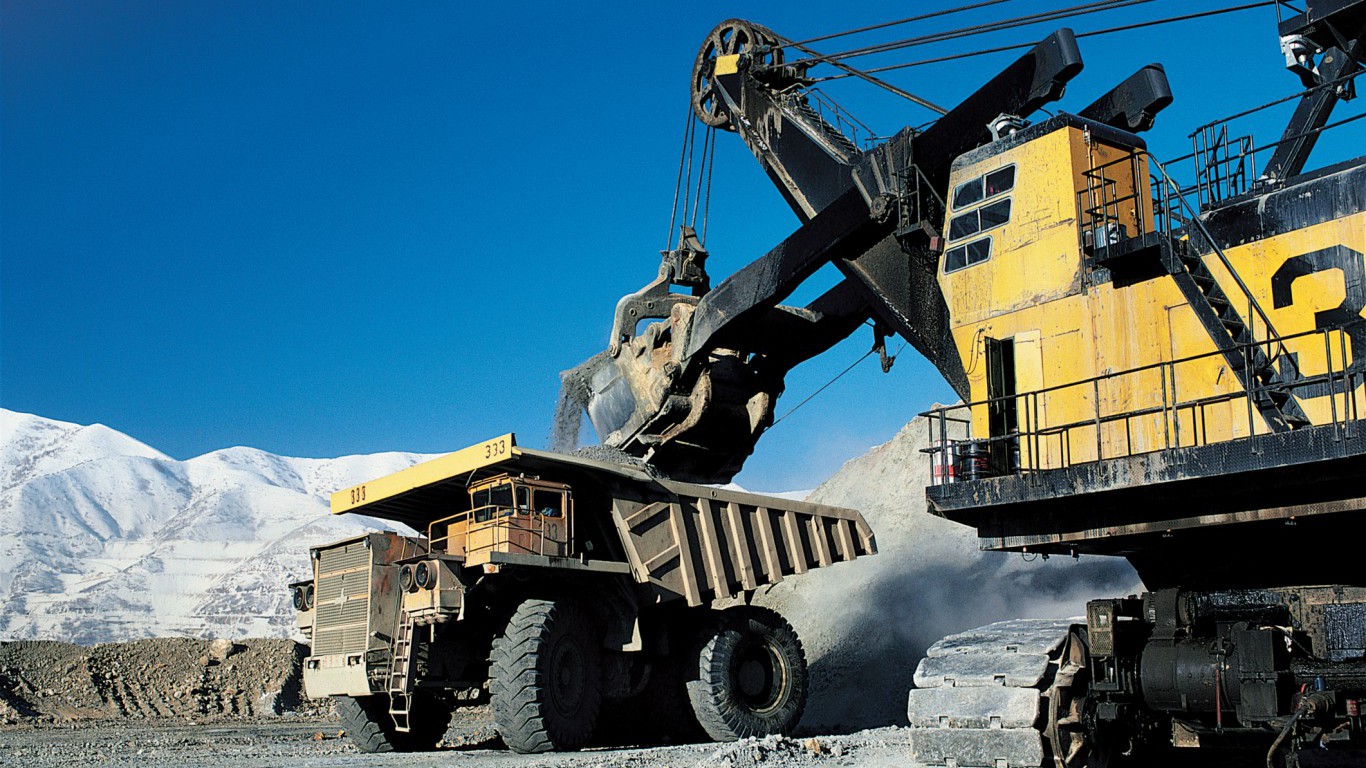
A recent CNBC/SurveyMonkey poll found that 85% of Americans are either somewhat satisfied or very satisfied with their jobs. Workers generally need good pay, a positive work environment, a manageable stress level, and a positive outlook for the future to feel good about their job. Employers are largely responsible for ensuring a positive working environment for their employees, but there are some occupations that are low paying, stressful, or dangerous for many workers in that field.
To determine the worst jobs in America, 24/7 Wall St. reviewed data from jobs website CareerCast’s 2019 Jobs Rated Report. Supplemental data on median annual wages and total employment count came from the Bureau of Labor Statistics’ Occupational Employment Statistics Program and is for 2018. Data on projected job growth from 2018 to 2028 came from the BLS Employment Projections program.
While many of the jobs on this list have low satisfaction due to low pay and/or high stress, others rank poorly because they are very dangerous. Some jobs require workers to use hazardous equipment or put themselves in harm’s way. These are the most dangerous jobs in America.
Due to automation, changing consumer preferences, and other factors, many of these jobs have already faced uncertain economic futures. With the outbreak of the coronavirus pandemic, some of the companies employing these workers are scrambling to stay afloat. Construction, entertainment, and retail workers have all been sent home due to physical distancing orders, putting a financial squeeze on some lower-income workers. These are the U.S. industries being devastated by the coronavirus.
Click here to see the worst jobs in America
Click here to see the best jobs in America

25. Welder
> Median annual wage: $41,380
> Total employment: 389,190
> Projected employment change 2018-2028: +3.4%
This job ranks as one of the worst jobs in America in part because of how physically demanding it is. Welders often work in confined areas or awkward positions with potentially dangerous equipment. Most entry-level jobs in the field require only a high school diploma. The median annual wage is $41,380, slightly above the median wage of $38,640 for all occupations.
[in-text-ad]

24. Automobile mechanic
> Median annual wage: $40,710
> Total employment: 648,050
> Projected employment change 2018-2028: -0.8%
Automobile mechanics face a challenging work environment, rolling under vehicles or leaning over them to inspect and repair different parts. There were nearly 650,000 auto mechanics in 2018, though that number is expected to fall slightly in the next decade. Newer cars are becoming more reliable, which is why the BLS projects the total number of mechanics will be lower in 2028 than it was in 2018.

23. Buyer
> Median annual wage: $62,750
> Total employment: 407,410
> Projected employment change 2018-2028: -7.4%
Buyers are responsible for purchasing the products or services their company needs. Though the job tends to pay well, with a median annual wage of $62,750, it can be very stressful. The field is projected to contract sharply by 2028, losing over 7% of the workforce. The job is being phased out by automation and outsourcing. For context, the average projected growth across all occupations is over 5% from 2018 to 2028.

22. Mail carrier
> Median annual wage: $55,210
> Total employment: 342,410
> Projected employment change 2018-2028: -19.8%
Due to budget constraints and innovations like automated sorting systems, the number of mail carrier jobs is projected to drop by nearly one-fifth from 2018 to 2028. The job can be challenging depending on the weather, as mail carriers must deliver the mail regardless of the conditions outside.
[in-text-ad-2]

21. Truck driver
> Median annual wage: $43,680
> Total employment: 1.8 million
> Projected employment change 2018-2028: +5.1%
The job of a truck driver is challenging and stressful, as it requires spending long periods on the road to meet deadlines. It can also be emotionally difficult, as truck drivers often spend days or even weeks on the road away from their families. Though there is no formal education to become a truck driver, they do need to earn a commercial driver’s license.

20. Roofer
> Median annual wage: $39,970
> Total employment: 128,680
> Projected employment change 2018-2028: +11.8%
Roofers work in one of the most dangerous jobs in America. They repair and install roofs, sometimes many stories up, often without harnesses or safety equipment. There were 51.5 fatal injuries per 100,000 fill-time equivalent roofers in 2018, according to the BLS, one of the highest totals among all jobs. The job is also physically demanding, often done in hot weather. Most roofers earn less than $40,000 per year.
[in-text-ad]

19. Brickmason
> Median annual wage: $50,950
> Total employment: 63,930
> Projected employment change 2018-2028: +9.7%
Brickmasons have to lift heavy materials and perform difficult physical tasks during their job, making it a stressful and demanding work environment. Most brickmasons earn over $50,000 per year, well above the median annual wage for all occupations. Yet they can often lose work opportunities due to inclement weather.

18. Construction laborer
> Median annual wage: $35,800
> Total employment: 1.0 million
> Projected employment change 2018-2028: +10.5%
There are over 1 million construction laborers in America, making it one of the most common jobs in America. The job is physically demanding, as the work can involve moving heavy equipment and materials, digging trenches, building braces, and much more, often outdoors.
The job is also one of the most dangerous in the country — there were 13 fatal injuries per 100,000 full-time equivalent construction laborers in 2018, one of the highest rates among any profession. Despite the demanding and potentially dangerous nature of the work, construction workers are not well paid. Most laborers earn less than $36,000 per year.

17. Chef
> Median annual wage: $48,460
> Total employment: 128,600
> Projected employment change 2018-2028: +11.1%
Chefs have one of the most stressful work environments of any job in America. They are required to work on their feet, sometimes over flames, preparing food on a tight schedule in lengthy shifts. Though chefs tend to earn more than the typical American worker, with most making over $48,000 annually, the job usually requires a considerable amount of experience. Chefs typically either go to culinary school or work in lower-paying apprentice positions in kitchens or restaurants for years before becoming chefs.
[in-text-ad-2]

16. Pest control worker
> Median annual wage: $35,610
> Total employment: 77,300
> Projected employment change 2018-2028: +6.9%
Pest control workers are typically not well compensated. The career’s median annual wage of $35,610 is about $3,000 lower than the median wage for all jobs. This occupation often requires working on weekends and in the evening. The job of exterminating and removing pests like insects and rodents is also physically challenging, as pest control workers often have to crouch, kneel, and get in tight spaces to remove pests. Workers must also take care when using harsh chemical pesticides.

15. Child care worker
> Median annual wage: $23,240
> Total employment: 564,630
> Projected employment change 2018-2028: +2.4%
Child care workers typically earn less than $23,500 per year, one of the lowest median annual wages among all jobs. The job can also be very stressful, as workers are tasked with watching over many children at the same time. There are over half a million child care workers in America, making it one of the more common jobs in the country.
[in-text-ad]

14. Bus driver
> Median annual wage: $34,450
> Total employment: 678,260
> Projected employment change 2018-2028: +4.8%
Bus drivers are not well-compensated, with most earning less than $35,000 per year. One reason for the relatively low pay is that many bus drivers are employed by schools and school districts, only working while school is in session. Strict schedules and dealing with unruly students can make bus driving a stressful job.

13. Firefighter
> Median annual wage: $49,620
> Total employment: 321,570
> Projected employment change 2018-2028: +5.3%
Fire fighting is one of the most dangerous jobs in America, as firefighters often enter burning buildings that may be structurally unsound to help put out the flames and rescue anyone inside. Adding to the job’s stress level, firefighters typically must live at the station for extended periods where they are on call. Firefighters often have their sleep interrupted, working shifts that can last well over 24 hours and often working more than 40 hours in a week.

12. Dockworker
> Median annual wage: $28,260
> Total employment: 2.9 million
> Projected employment change 2018-2028: +4.9%
With nearly 2.9 million Americans in the field, this job is one of the most common in the country. Like other employees in jobs with no formal educational requirements, dockworkers do not tend to earn high wages. The median annual salary of dockworkers is $28,260, about $10,000 lower than the median annual wage for all jobs. Moving heavy crates can be perilous — there were 5.8 fatal injuries per 100,000 full-time dockworkers in 2018.
[in-text-ad-2]

11. Painter
> Median annual wage: $38,930
> Total employment: 231,200
> Projected employment change 2018-2028: +6.0%
Painters may paint walls, equipment, buildings, and other surfaces. They are typically paid less than $39,000 a year, roughly in line with the median salary across all occupations in the United States. Painters may work in precarious conditions, sometimes many stories in the air. They can also lose work opportunities due to weather conditions.

10. Broadcaster
> Median annual wage: $33,220
> Total employment: 27,780
> Projected employment change 2018-2028: -7.3%
Broadcasters read news reports and commercial messages, announce artists, or interview guests for radio and TV stations. This career is in decline, as stations are consolidated and turn to syndicated programming. Even though more than 42% of broadcasters have at least a bachelor’s degree, they are typically not well compensated. The occupation has a median annual wage of $33,220 — more than $5,000 less than the median across all jobs.
[in-text-ad]

9. Advertising salesperson
> Median annual wage: $51,740
> Total employment: 133,110
> Projected employment change 2018-2028: -2.2%
Among the 25 worst jobs in America, advertising sales is one of just two occupations in which most workers have at least a bachelor’s degree. Advertising salespeople are responsible for selling ad space — a job that is becoming increasingly difficult. With the decline of print newspapers and the increasing automation of online advertising, demand for ad salespeople is projected to decline. The BLS projects there will be 2% fewer advertising salespeople in 2028 than there were in 2018.

8. Nuclear decontamination technician
> Median annual wage: $42,030
> Total employment: 44,000
> Projected employment change 2018-2028: +10.6%
Nuclear decontamination technicians are tasked with removing nuclear waste and other hazardous materials. The job can be perilous and requires numerous safety precautions, including protective suits and up to 40 hours of safety training. In addition to the hazardous environment, the job can also be challenging because it often requires the technicians to work overtime, including nights and weekends.

7. Disc jockey
> Median annual wage: $27,720
> Total employment: 7,480
> Projected employment change 2018-2028: +2.5%
Disc jockeys act as a master of ceremonies at weddings, parties, clubs, sporting events, and other places, making announcements and playing music over public broadcast systems. The job requires little formal education or training. Disc jockeys are not typically well compensated, and most earn less than $28,000 per year.
[in-text-ad-2]

6. Correctional officer
> Median annual wage: $44,330
> Total employment: 415,000
> Projected employment change 2018-2028: -7.2%
Corrections officers are responsible for overseeing those who have been charged or convicted of crimes in jails and prisons. The job is a stressful one, as these officers are often involved in confrontations with inmates. It is also a challenging occupation because many officers have to work long shifts, including nights and weekends. Due to state and local budget issues that constrict hiring of new corrections officers, the number of correctional officers is expected to decrease by more than 7% by 2028.

5. Enlisted military personnel
> Median annual wage: N/A
> Total employment: N/A
> Projected employment change 2018-2028: N/A
Enlisted military personnel face one of the most challenging working environments of any job. Enlisted personnel make up over 80% of America’s armed forces, the rest being officers. Enlisted personnel perform military operations like combat, equipment repair, providing humanitarian relief, and much more.
The job can be dangerous, particularly for those in combat. It is also challenging because deployed personnel spend months away from their families. Military pay changes based on the rank of the service member. Those at the lowest rank earn less than $1,700 per month — roughly $20,000 per year.
[in-text-ad]

4. Retail salesperson
> Median annual wage: $24,200
> Total employment: 4,448,120
> Projected employment change 2018-2028: -2.3%
Workers in retail sales, like those in other career fields that do not typically have educational requirements, are not well compensated. The median wage for retail sales workers is less than $24,500 per year. Retail sales workers typically have to work nights and weekends, often dealing with demanding customers. The number of people in this job is expected to decline over the next decade as online retailers replace the brick-and-mortar businesses that employ these workers.

3. Newspaper reporter
> Median annual wage: $41,260
> Total employment: 37,140
> Projected employment change 2018-2028: -12.1%
The median annual wage for newspaper reporters is $41,260, higher than the median wage among all jobs. However, over 86% of reporters hold at least a bachelor’s degree, and compared to college-educated workers in other jobs, reporters earn far less. Most jobs considered for this list that typically require at least a bachelor’s degree have a median annual wage over $70,000. As newspapers face economic challenges, reporters are projected to become much less common. The BLS projects the total number of newspaper reporters will decline by more than 12% by 2028 compared to 2018.

2. Logging worker
> Median annual wage: $40,650
> Total employment: 37,400
> Projected employment change 2018-2028: -13.9%
Logging worker ranks as the most dangerous job in America. The occupation had a U.S.-high 97.6 fatal accidents per 100,000 full-time workers in 2018. Much of the equipment used by logging workers has either been improved or automated in recent years. As a result, the total number of logging workers is projected to decline by 13.9% over the next decade, making it one of the fastest disappearing jobs in America.
[in-text-ad-2]

1. Taxi driver
> Median annual wage: $25,980
> Total employment: 207,920
> Projected employment change 2018-2028: +19.5%
Because of the low pay, challenging hours, and stressful work environment, taxi driving ranks as the worst job in America. Most taxi drivers earn less than $26,000 per year — over $12,000 short of the median wage for all Americans jobs. Taxi drivers often work long shifts, and on nights and weekends. It is considered a stressful job, as drivers must contend with traffic and potentially unruly riders. As more and more people turn to ride sharing services like Uber and Lyft, there will be increased competition for riders, potentially hurting earnings even more.
Take This Retirement Quiz To Get Matched With An Advisor Now (Sponsored)
Are you ready for retirement? Planning for retirement can be overwhelming, that’s why it could be a good idea to speak to a fiduciary financial advisor about your goals today.
Start by taking this retirement quiz right here from SmartAsset that will match you with up to 3 financial advisors that serve your area and beyond in 5 minutes. Smart Asset is now matching over 50,000 people a month.
Click here now to get started.
Thank you for reading! Have some feedback for us?
Contact the 24/7 Wall St. editorial team.
 24/7 Wall St.
24/7 Wall St. 24/7 Wall St.
24/7 Wall St. 24/7 Wall St.
24/7 Wall St. 24/7 Wall St.
24/7 Wall St. 24/7 Wall St.
24/7 Wall St.

